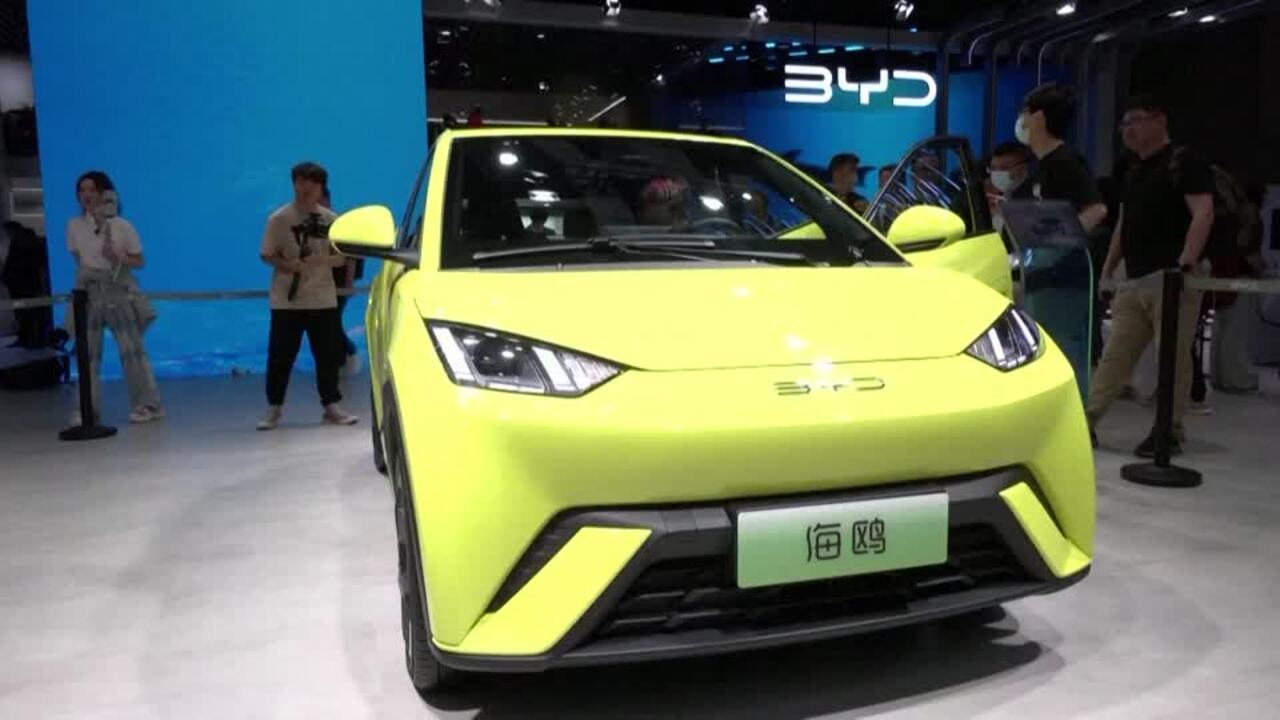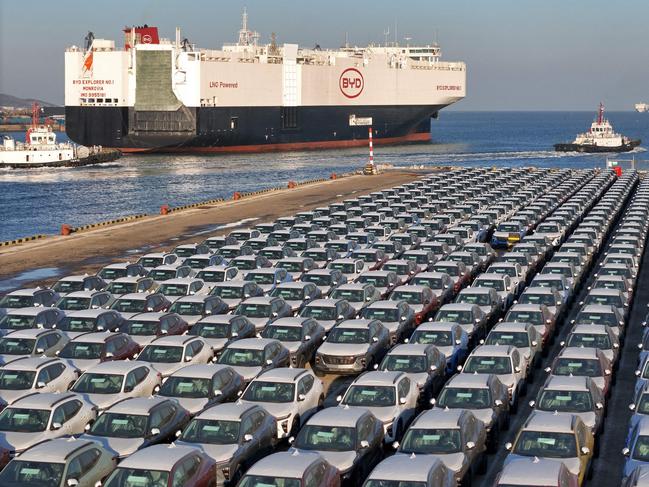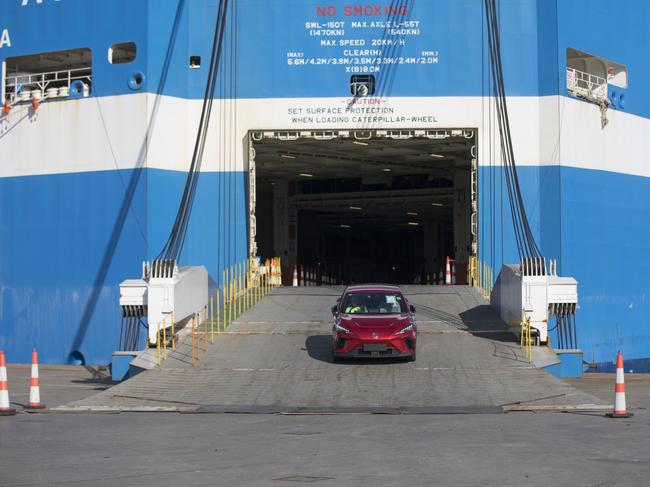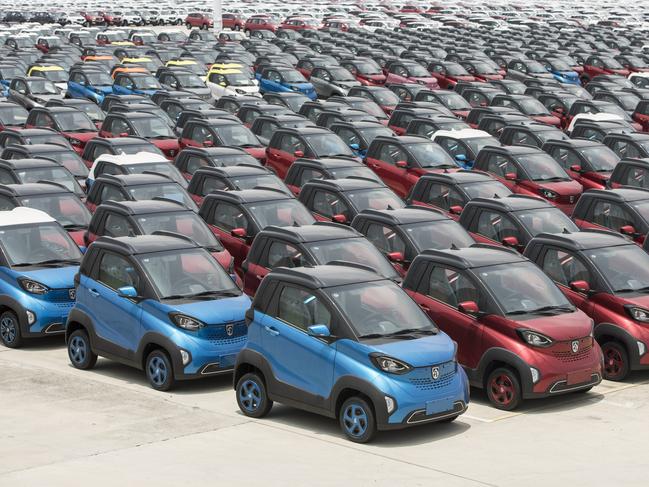‘Cold war’: Chinese EVs slapped with huge tax
China’s thriving electric vehicle market has taken a monster hit with the EU slapping new tarriffs on its vehicles. There are fears it could spark an “economic cold war”.

Motoring
Don't miss out on the headlines from Motoring. Followed categories will be added to My News.
China’s thriving electric vehicle market has taken a brutal hit after the European Union voted to slap huge additional taxes on all EVs made in China.
Ten EU member states including France, Italy and Poland supported imposing the tariffs of up to 35.3 percent, coming on top of existing duties of 10 percent.
Only five including Germany and Hungary voted against while 12 abstained including Spain and Sweden – not enough to block the tariffs.
The EU – which provisionally approved the tariffs in June after an inquiry found Beijing’s state aid to auto manufacturers was unfair - now has free rein to impose steep tariffs for five years starting next month.
The move is a massive hit for China and its rapidly-expanding EV market, which Statista projects will be worth US$376.4 billion in revenue this year alone.
Beijing said on Friday it “firmly opposed” the “protectionist” decision. It has already launched retaliatory probes into European brandy, dairy and pork products into China.
Canada and the United States have in recent months imposed much higher tariffs of 100 percent on Chinese electric car imports.
Australia, on the other hand, has welcomed Chinese EVs with open arms.
Over 80 per cent of electric vehicles sold in Australia are made in China – including affordable BYD models and Tesla’s hugely popular Model 3 and Model Y.

China’s fury over huge EV tax
China’s commerce ministry in response said it “firmly opposes the EU’s unfair, non-compliant and unreasonable protectionist practices in this case.”
The ministry urged EU countries to “return to the right track” by resolving trade friction through dialogue, promising to “safeguard the interests of Chinese companies.”
Chinese car giant Geely - one of the country’s largest sellers of EVs - expressed “great disappointment” in the move.
“The decision is not constructive and may hinder EU-China economic and trade relations, ultimately harming European companies and consumer interests,” the firm said.
Noah Barkin, senior advisor at Rhodium Group, told Reuters there was a very real risk the move could doom the chances of a negotiated solution to the EU-China trade dispute.
“The risk is that Beijing feels a need to respond to the duties with retaliatory measures of its own, which torpedo the chances of a negotiated solution,” he said.
Trade tensions between China and the EU are not limited to electric cars, with inquiries launched by Brussels also targeting Chinese subsidies for solar panels and wind turbines.
The bloc faces a difficult task as it tries to foster its clean tech industry and invest in the green transition without sparking a painful trade war with China.

One country set to lose the most
Germany, renowned for its strong auto industry and its key manufacturers including BMW, Volkswagen and Mercedes heavily invested in China, urged the commission not to go ahead.
“The EU Commission should not trigger a trade war despite the vote in favour” of the tariffs, German Finance Minister Christian Lindner said.
“We need a negotiated solution.”
German auto giant Volkswagen said it was “the wrong approach and would not improve the competitiveness of the European automotive industry.”
The carmaker, which has some 300,000 workers in Germany, has already been hit hard by high manufacturing costs, a stuttering switch to electric vehicles and rising competition in key market China.
Hungary has also been vocal in its opposition.
Before the vote, Prime Minister Viktor Orban blasted the tariffs as “the next step in the economic cold war”, which he said was “a huge threat to Hungary”.
France is set to be hurt most by China’s dairy probes.
It exported US$211 million worth of the targeted dairy products – mostly milk and cream – last year.
Other nations will also suffer if China enacts dairy bans – with Italy ($65 million), Danish ($55 million), Dutch ($52 million)and Spanish ($49 million) all being key exporters.

Chinese EVs galore in Australia
The Australian market – which has no domestic car manufacturing industry to protect - has been flooded with Chinese electric cars in recent years.
The influx has sent prices plunging amid fierce competition between the main players.
Scott Dwyer from the University of Technology Sydney’s Institute for Sustainable Futures explained why Australia was such an attractive market for Chinese EV heavyweights like BYD and MG.
“Typical markets for exporting — Europe and the US — have really started to introduce different trade barriers and make it difficult for Chinese EV importers,” Dr Dwyer told the ABC in June.
“So, the Chinese autos are looking and saying, ‘Well, [Australia] is an attractive market. There’s still incentives and subsidies that support electric vehicles … [and] there’s not such great choice for Australian consumers due to a bit of a vacuum that’s existed here.’
“And these factors are all conspiring to make Australia look quite an attractive market, given we sell 1.1 million cars a year, and the uptake of EVs is still growing.”
Australia-China Relations Institute academic Dr Marina Yue Zhang warned that any attempt to impose tariffs Down Under would come at a cost.
“If bilateral relations between Australia and China deteriorate, China could retaliate by targeting areas where it can find alternatives to Australian exports,” Dr Yue warned.
“This risk is particularly pronounced during periods of economic downturn in China, when its demand for Australian commodities and agricultural goods may weaken.

Trade war prospect comes at horrible time for UK
Meanwhile, Britain is in a world of pain.
The nation’s automobile trade body asked the country’s new government for greater support to boost sales of electric vehicles, saying manufacturers’ collective discounts this year worth £2 billion (US$2.6 billion) were unsustainable.
In an open letter to Finance Minister Rachel Reeves, the Society of Motor Manufacturers and Traders (SMMT) said EVs’ share of new car sales was set to miss out on the Labour government’s zero emission vehicle target this year - despite a record September.
“Unfortunately, the private consumer has no fiscal incentive to switch and so our ZEV market looks set to miss its target,” said an open letter co-signed by the UK heads of auto giants including BMW, Ford and Mercedes-Benz.
“The consequences of this will not just be environmental but economic,” the letter added, signed by other carmakers including Jaguar Land Rover, Kia, Nissan, Vauxhall-maker Stellantis and Volkswagen.
Britain’s car manufacturing industry is dominated by foreign players, whose UK-made vehicles are mostly exported.
UK automakers on Friday forecast new EV sales in the UK will account for 18.5 percent of car sales by the end of the year, below the previous Conservative government’s 22-percent target.
This despite September being a record month in terms of new battery EV car registrations, “driven by massive manufacturer discounting”, SMMT said in data published alongside the letter.
“Despite manufacturers spending billions on both product and market support -- support that the industry cannot sustain indefinitely -- market weakness is putting environmental ambitions at risk and jeopardising future investment,” said SMMT chief executive Mike Hawes.
- With AFP
Originally published as ‘Cold war’: Chinese EVs slapped with huge tax



